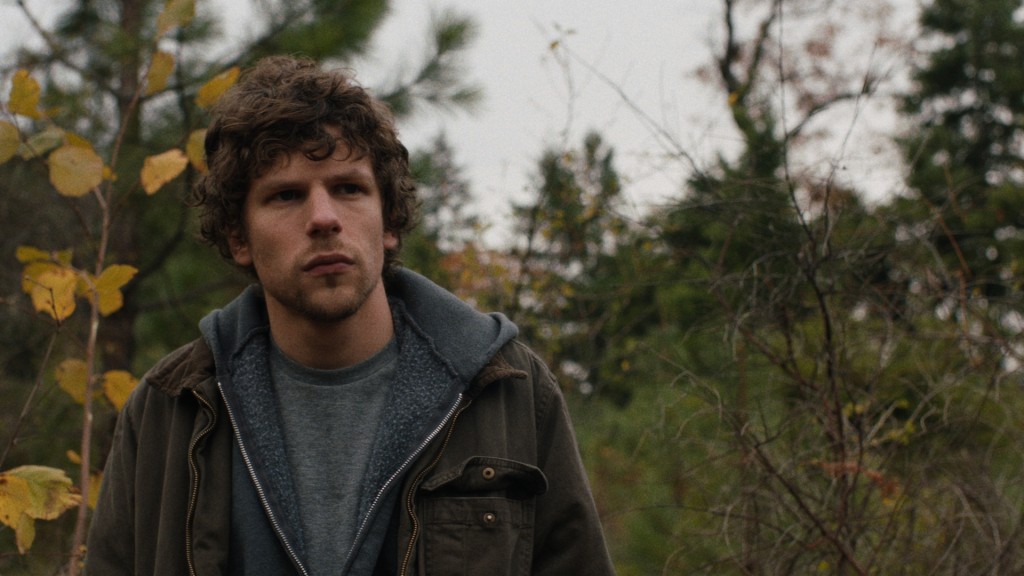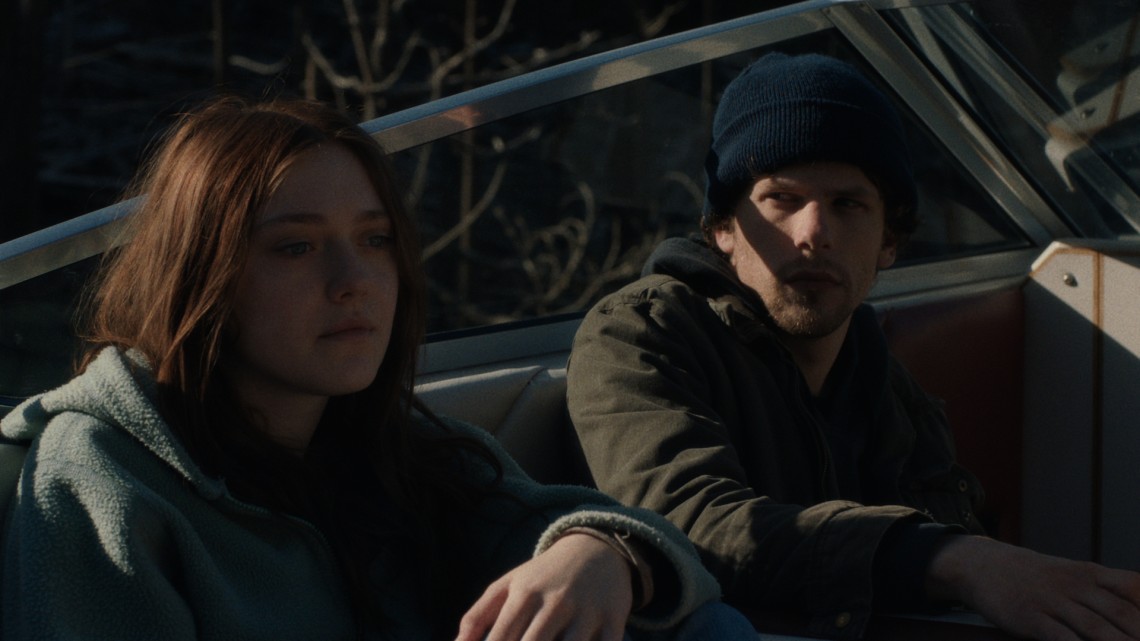If you’ve ever watched a Jesse Eisenberg performance, you’ve most likely formed an image of him in your mind as the loquacious aggro-nerd: the man fills the air with a rapid-fire staccato of verbiage that flips between hostile (The Social Network) and neurotic (The Squid and the Whale, Zombieland). Eisenberg’s gift for mercurial chatter is the sharpest weapon in his arsenal, which makes his role in Night Moves, the latest work by American filmmaker Kelly Reichardt, something of a curiosity. Here, he clams up with such taciturn dedication that he’s practically a mollusk.
The “why” behind his reticence is the picture’s hushed central mystery, but Reichardt isn’t much for talking. Even her most verbal films, Old Joy and Meek’s Cutoff, leave enough unsaid in between fits and spurts of reigned-in dialogue that audiences must fill in the gaps on their own; Wendy and Lucy, meanwhile, features a Michelle Williams who’s so quiet as to be mute. Overtness doesn’t suit Reichardt’s style as a general rule, and Night Moves sees her operating on a whole new plane of restraint, even compared to the rest of her filmography.
And that’s a good thing. Night Moves never defies comprehension, instead inviting us to fully step into Reichardt’s portrait of radical youthful angst. The film collects three zealous environmentalists – Josh (Eisenberg), Dena (Dakota Fanning), and Harmon (Peter Sarsgaard) – living in southern Oregon, as they conspire to destroy a hydroelectric dam with homegrown explosives. Cagey Josh is their ostensible leader, the glue that brings them together, while ex-marine Harmon brings the know-how required to fashion a bomb out of fertilizer. Rich girl Dena, meanwhile, greases the wheels of the scheme with currency; all told, they’re an odd trio, mismatched in all aspects except their shared disdain for government and industry.
What, exactly, drives them to eco-terrorism? Youthful impertinence, perhaps,or maybe just general societal disillusionment. Nobody ever provides a sweeping soliloquy about their motivations. That would be too unlike Reichardt; more importantly, it would also undercut Night Moves‘ overarching sense of distrust and ethical uncertainty, both of which ratchet up the suspense, which may leave viewers squirming as the narrative moves into its third act. These are not people who can afford to communicate their feelings any more than necessary. In point of fact, the film treats personal expression as a kind of danger.

Reichardt conducts the ebbs and flows of Night Moves with a hauntingly controlled grace. Even following Meek’s Cutoff, a Western picture with more than its fair share of tense confrontations, Night Moves feels like a gear-shift for her. Reichardt’s cinema is typically humanist in bent; she’s less concerned with action and more concerned with the people she and frequent screenwriting collaborator Jonathan Raymond write about. Night Moves stitches both of these together, at first focusing intently on the buildup and execution of her leads’ plan before spending the rest of the picture demonstrating how the experience impacts them. Up to that point, we only learn about Josh, Dena, and Harmon through elliptical means. It takes chaos for us to get to the bottom of who they really are.
Eisenberg scowls and keeps Josh guarded throughout; he sparks to life early in the film’s running time, seething with anger over electronic consumerism, but mostly plays his cards close to the vest. Broken, paranoid, and unmoored, Josh is so wrapped up in his own ennui that he literally cannot see the forest for the trees. It’s a masterfully reigned-in turn by a gifted and growing actor, one that requires him to say little and yet still speaks volumes. To Fanning and Sarsgaard’s credit, they avail themselves handsomely – the former leans on her child-star innocence, the latter his laid-back, burly charms.
But Night Moves is primarily Eisenberg’s and Reichardt’s show, a story of spiritual alienation set against the natural backdrop that defines so much of the director’s work. In Old Joy, nature is a place of both reunion and divergence; in Meek’s Cutoff, it’s a stage for battling against patriarchy, a contested, harsh land that must be survived. In Night Moves, nature is misunderstood, a pristine landscape incongruously protected through brute force and destructive violence. Maybe it’s Reichardt’s muzzled critique of America’s muddled approach to preservation. Maybe Josh really just wants to blow something up. As ever, Reichardt’s minimalism leaves us to seek out our own answers to the questions she poses, but it’s in how she poses them that Night Moves leaves its mark.




















